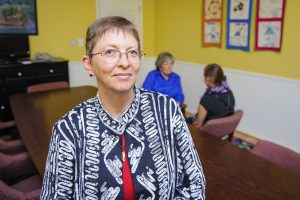
By David Miller
University of Alabama researchers are working with social service providers to implement an intervention intended to help manage problem behaviors in children who’ve experienced trauma.
UA has partnered with the Alabama Department of Human Resources and Indian Rivers Behavioral Health to implement Trauma Systems Therapy, an evidenced-supported, trauma-specific intervention that focuses on environmental factors related to a child’s traumatic experiences.
More than 100 foster parents, social workers, therapists and child services professionals attended a TST community training session Wednesday, Aug. 22 at the Alabama Fire College in Tuscaloosa. Attendees received an overview and rationale of the TST model developed by Dr. Glenn Saxe of New York University Medical School, as well as information on how trauma affects brain development and behavior. The program’s core group of researchers and providers will receive TST training through the end of the week.
“If you can see that the behaviors traumatized children show are a result of their trauma and are a result of them trying to survive that trauma, that’s fundamentally different than thinking, ‘you’re a bad kid,’” said Dr. Debra Nelson-Gardell, associate professor of social work at UA and co-coordinator of the project. “If you understand that this child is not acting out because they’re bad or because they’re trying to hurt you, you end up reacting to the child differently.”
DHR and IRBH initially partnered with UA researchers to develop a TST pilot in 2016 after a presentation at the Recognizing the Effects of and Approaches to Childhood Trauma Summit on UA’s campus.
TST coordinators anticipate serving up to 25 children during the first year of TST in Tuscaloosa, with as many as eight at one time. All of the children served during the first year will be referred by DHR, and some in that group may be at risk of disrupting their home placements.
Various components of the program will be implemented by a number of local agencies over the next six months. Tuscaloosa’s TST program will have a system of assessments, program evaluations, in-home trainings and therapy by the Alabama Youth Services Institute, DHR, Indian Rivers, and UA researchers and doctoral students. Additionally, Saxe will train program coordinators to operate the program with fidelity, a benchmark needed for evidenced-based programs to grow and be effective, Nelson-Gardell said.
The multidisciplinary approach may see as many as 10 people interacting with the child each week, and they’re all part of each child’s case review, which strengthens the foundation of what makes TST both unique and effective: understanding the numerous triggers that can lead to problem behavior, even if a child’s trauma isn’t known.
“These children have meltdowns, blow-up behaviors that get them kicked out of residential facilities or school, or behaviors that foster families don’t know how to deal with,” Nelson-Gardell said. “This approach does a very thorough and systematic review of what’s going on around the child. The effort is to change what happened in the environment that triggered the child so that you can modify and be aware of that, which will allow the therapy to help the child better manage their feelings and have better behavior.”
